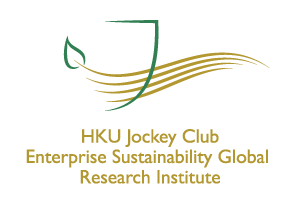
HKU Jockey Club Enterprise Sustainability Global Research Institute
World-Class Hub for Sustainability
Pulak Ghosh | Qingwei Wang | Jian Zhang | Hong Zou
Customer Response to Corporate Social Responsibility: Evidence from Mandatory CSR Spending
Nov 6, 2025
Key Takeaways
- Research Question: How do customers respond to a firm’s increased CSR/ESG performance?
- Data & Method: The authors use product-level sales data of Indian manufacturing firms (2009–2018) and adopt a difference-in-differences (DiD) analysis. They further validate their findings through a difference-in-discontinuity test that leverages the discontinuity created by the CSR spending mandate.
- Findings
- Firms subject to the CSR spending mandate experience an increase of about 11% in product-level sales in the period of five years after the law change, relative to exempt firms.
- The sales boost is observed in both business-to-business (B2B) and business-to-consumer (B2C) firms, with stronger effects in B2C firms.
- The impact is more pronounced in competitive industries and among firms with lower prior advertising intensity.
- Despite higher CSR spending, firms achieve greater profitability, higher R&D investment, and more new product launches.
- Implications: Well-designed CSR policies can serve as a powerful lever for influencing firms to engage in CSR activities and creating business value, thereby underscoring the positive potential of regulatory approaches to CSR.
Source Publication:
Ghosh, P., Wang, Q., Zhang, J., & Zou, H. (2025). Customer Response to Corporate Social Responsibility: Evidence from Mandatory CSR Spending. SSRN Working Paper.
Background and Research Questions
Firms are expected to do “good,” and they face growing pressure to improve CSR performance. Extant literature has examined the impact of firms’ CSR performance on broad outcomes such as firm risk, accounting performance, and firm value. Though prior studies find high-CSR firms exhibit greater resilience during crises or industry downturns, the need remains for more studies on whether customers value CSR performance and, consequently, patronize these firms more consistently—not just during crises.
No consensus exists on whether customers truly respond to firms’ CSR performance. On the one hand, customers may have certain moral values and therefore reward firms with better CSR performance by purchasing more of their products. On the other hand, customers may merely engage in cheap talk, claiming to value firms’ CSR performance while showing reluctance to adjust their actual purchasing behavior.
Moreover, whereas the contemporaneous studies focus on B2C firms, few studies address broader industries where customers include both institutional customers (i.e., the B2B setting) and individual customers. Given that CSR decisions are often endogenous choices, and changes in CSR ratings may coincide with changes in firm fundamentals, identifying the causal effect of CSR on customer purchases remains a significant empirical challenge. This study provides evidence on how customers respond to firms’ improved CSR performance, by examining the impact of a legal mandate that creates plausibly exogenous changes in firms’ CSR activities.
Data and Methodology
Using a unique product-level sales dataset from the CMIE Prowess database, the authors examine whether customers value firms’ CSR performance and quantify how CSR spending translates into tangible product market outcomes. This study utilizes DiD analyses, leveraging the passage of Section 135 of the 2013 Indian Companies Act that requires firms meeting certain size criteria to spend a minimum of 2% of the pre-tax profit on CSR initiatives annually.
The sample focuses on “low-CSR firms” whose average CSR ratio is less than 2%. To better control for the differences between the treatment group and the control group, this study employs entropy balancing to create a matched sample. We further sharpen identification by limiting the sample to firms just below and above the size threshold and conduct a difference-in-discontinuity analysis.
Findings and Discussion
The implementation of the mandate leads to a significant increase in CSR spending among treatment firms. Firms mandated to increase CSR spending exhibit a significant increase in product-level sales. Over the five years following the law change, their product-level sales rose by 11.5 % compared with the matched control group. This pattern suggests customers value firms’ increased CSR spending and reward such firms with increased purchases.
The sales boost is observed in both B2B and B2C firms, with stronger effects in B2C firms. Cross-sectional analyses also show the treatment effect is particularly pronounced for firms facing higher market competition. This finding aligns with the view that CSR helps firms differentiate themselves from rivals in highly competitive markets. Additionally, firms with lower pre-existing advertising intensity benefit more from better CSR performance, suggesting a substitution relationship between advertising and CSR activities.
This study also examines the economic consequences of the CSR spending mandate. Consistent with the notion of “do well by doing good,” treatment firms become more profitable than the control group. Moreover, we show treatment firms increase R&D investment and new product launch after the implementation of the CSR spending mandate.
Implications
This study adds to growing research on whether consumers value and respond to firms’ CSR performance. We expand the scope of CSR-customer research beyond retail sectors to firms in a wider range of industries. This approach allows us to shed light on customer responses to both B2B and B2C firms.
Importantly, our paper not only provides novel causal evidence on the impact of mandatory CSR spending on customer purchasing behavior, but also enhance our understanding of the costs and benefits of mandatory CSR spending regulations. By examining legally mandated CSR spending rather than firms’ discretionary CSR activities, this study highlights a bright side of CSR spending regulations.
For policymakers, our results indicate well-designed CSR mandates can create a win-win situation where both social responsibility and business performance are enhanced. By incentivizing CSR engagement, such policies positively influence customer behavior, increase firm profitability, and promote innovation.